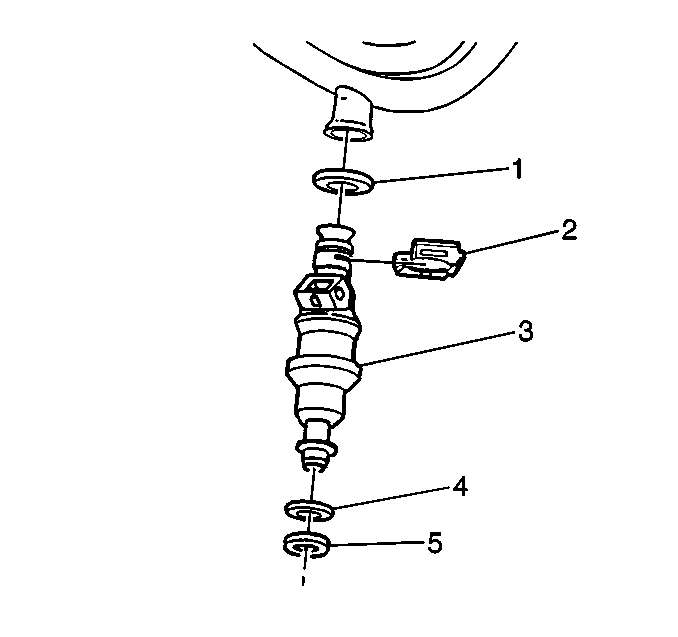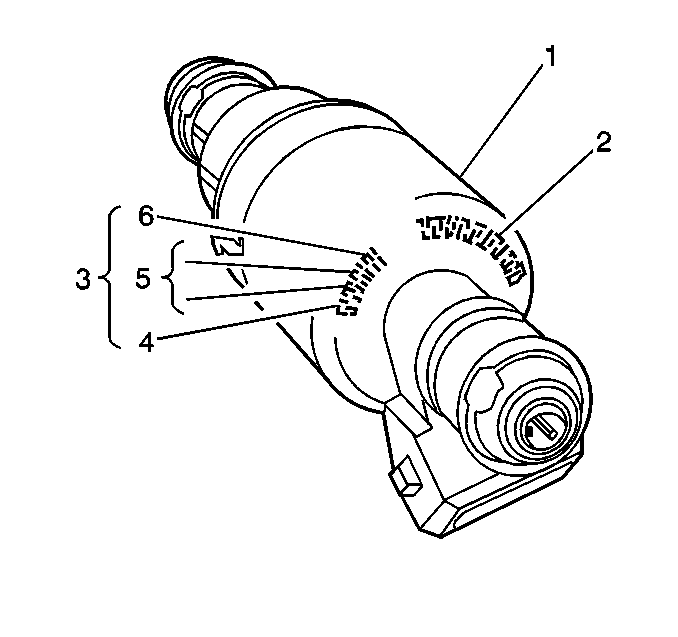Removal Procedure
Notice: Use care in removing the fuel injectors in order to prevent damage to the fuel injector electrical connector pins or the fuel injector nozzles. Do not immerse the fuel injector in any type of cleaner. The fuel injector is an electrical component and may be damaged by this cleaning method.
Important: The fuel injector is serviced as a complete assembly only. If the fuel injectors are found to be leaking, the engine oil may be contaminated with fuel. Fuel injector O-rings should always be replaced whenever fuel injectors are serviced.
Important: The fuel injector O-rings should always be replaced whenever fuel injectors are serviced.
Each fuel injector is calibrated for a specific flow rate. Be sure to use the correct part number when ordering replacement fuel injectors. The fuel injector lower O-ring uses a nylon collar, called the O-ring backup in order to properly position the O-ring on the fuel injector. Be sure to reinstall the O-ring backup, or the sealing O-ring may move on the fuel injector when installing the fuel rail. If the sealing O-ring is not seated properly, a vacuum leak is possible and driveability complaints may occur.- Relive the fuel pressure. Refer to Fuel Pressure Relief .
- Remove the fuel rail. Refer to Fuel Injection Fuel Rail Assembly Replacement .
- Remove the fuel injector retaining clips (2).
- Remove the fuel injectors (3).
- Remove the fuel injector upper O-ring (1).
- Remove the fuel injector lower O-ring (5).
- Remove the O-ring backup (4).

Installation Procedure
Important: When ordering new fuel injectors, be sure to order the correct injector for the application being serviced.
The upper and lower fuel injector O-rings use different part numbers. To identify the correct O-ring, the upper O-ring is black and the lower O-ring is brown. Both O-rings are the same size but consist of different material. The fuel injector lower O-ring uses a nylon collar, called the O-ring backup, to properly position the O-ring on the injector. Always reinstall the O-ring backup, or the sealing O-ring may move on the injector when installing the fuel rail and result in a possible vacuum leak. Fuel injector O-rings should always be replaced whenever fuel injectors are serviced
The fuel injector assembly (1) is stamped with a part number identification (2) and a build date code (3). The build date code consists of the month (4) 1-9 (Jan-Sept) O, N, D, (Oct, Nov, Dec), day (5), and year (6).
- Coat all new O-rings with engine oil before installing
- Reinstall the fuel injector back up O-ring (4).
- Reinstall the fuel injector lower O-ring (5).
- Reinstall the fuel injector upper O-ring (1).
- Reinstall the fuel injector to the fuel rail (3).
- Reinstall the fuel injector retaining clips (2).
- Reinstall the fuel rail. Refer to Fuel Injection Fuel Rail Assembly Replacement .
- Tighten the fuel fill cap.
- Reconnect the negative battery cable. Refer to Battery Negative Cable Disconnection and Connection in Engine Electrical.
- Inspect for fuel leaks.
- Reinstall the fuel injection sight shield. Refer to Fuel Injector Sight Shield Replacement in Engine Mechanical.

| 10.1. | Turn the ignition switch ON for 2 seconds. |
| 10.2. | Turn the ignition switch OFF for 10 seconds. |
| 10.3. | Turn the ignition switch ON. |
| 10.4. | Check for leaks. |
